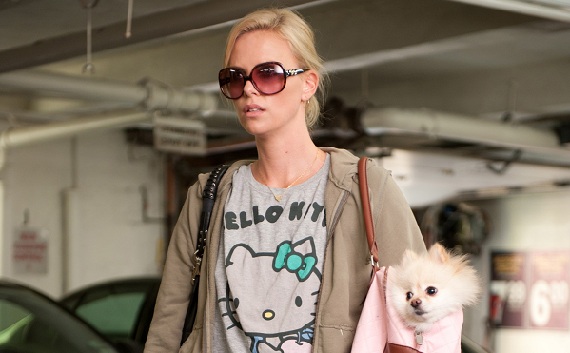In Young Adult, Diablo Cody has, honest to blog, written her most natural sounding script to date. Everything that Charlize Theron says could be reasonably expected to emerge from the mouth of a 37 year old woman desperate to recapture the glory of her youth, to recreate the days before real life took hold and disappointment kicked in.
It's a pity, then, that the film seems so distant. It's not happy, but it doesn't have to be; it would be hypocritical of me to complain on one day that The Artist was too happy and Young Adult was too bitter. This is supposed to be a character study of Theron's Mavis Geary, but it's more of a snapshot of someone that we would like to know better, and someone that we feel more sympathy than distaste for.
Alas, it's not to be, and Young Adult comes to us as a compelling film, but one that feels strangely incomplete.
Mavis Geary is suffering writer's block over the final instalment of the once popular Young Adult Waverly Prep novels. When she receives an email from her high school and college sweetheart (Patrick Wilson) announcing the birth of his baby, she elects to return to her home town to "save†him from the drudgery of small town life and to make him realise that they were meant to be together.
That description could go either way: Mavis is definitely delusional, but Theron mercifully refrains from playing the character as psychotic. Theron is in every scene and effectively carries the movie. It's a testament to her ability that she comes across as thoroughly unpleasant, but not loathsome. There is no juncture where you feel like she doesn't have a reason for her actions. This isn't the first time that she's been developmentally arrested (who among us could forget Mr. F?), but never before has she driven away from a bar while shouting "babies are gross!†at anyone who cares to listen. While the movie never quite connects with the audience, Theron brings a vulnerable mixture of vanity and a complete lack thereof to the character and she deserves every plaudit that she receives.
Less successful is Patton Oswalt's Matt, who comes on screen as "the hate crime guyâ€, Mavis' locker neighbour who was beaten to the point of disability for being presumed gay in senior year. The character is more Cody's fault than Oswalt's, because she leans too heavily on the crutch (yesss) of his stereotypical "fat geek†(a role that he played, somewhat differently, in 2006's execrable Failure to Launch). When he offers Mavis some home-distilled whiskey from his "Mos Eisley†label, it's nearly impossible not to cringe. Here is a character who has every reason to be angry at the universe, and Cody has wasted a vital part of his screen time by making him play slavishly to a useless type. When he tells Mavis "guys like me are born loving women like youâ€, he damn near derails the movie.
His situation is unique and leads to the movie's only moments of heightened reality, but he decays into a safe figure – not of fun, but of the pathetic. This is a great pity, because the rest of the town's reception of him – proving that they really just don't get it, and never bothered trying to know him – is entirely valid. Obvious and catastrophic narrative choices drag the third act into a gutter that can never be escaped, but then the movie is over and we're not sure if anything has been gained from Mavis' trip to the past. This ambivalence can be taken as a strength, but Mavis is still near as much of a mystery to both herself and the audience as she was at the film's beginning.
Reitman's hand is far less judgemental here than the ruinous moralising that he took to Up In The Air, but his detachment becomes off putting as a result. The opening credits sequence relies heavily on repetition that draws a fine line between thematic significance and annoying the audience. In Mercury he provides an image of people generally satisfied with the lives that they're leading, even if a big city outsider might consider their existences dead-end and meaningless, but we get a handle on practically none of the images that we're presented.
As Buddy, Patrick Wilson doesn't know exactly who he's playing, but he tries his hardest; his weak beard reflects as much. At times it feels as if the film is waging an internal battle between grating quirkiness ("Nipple Confusionâ€) and sincerity. Sincerity edges out in front, but it's had to compromise itself to get to that point. As the film progresses, Reitman gradually divorces the audience from the experience until we're left with only the most tenuous connection to the last 94 minutes of our lives.
It's not surprising that Young Adult lasted barely two weeks in Australian cinemas: it's a hard sell that's awkward and negative, and no one is going to come out of it feeling better about themselves or anyone else. It's a mostly good movie, but it's tough to take and it doesn't entirely click.



All but two characters in the movie are surface-level affairs. This would be fine if the two character portraits were up to snuff… but they really aren’t. In both cases, we get an oversimplified narrative. Both characters are seemingly reduced to one traumatic event in the past, as if one couldn’t be delusional or fat/nerdy unless they experienced tragedy early on…
I’m normally bothered by movies like this because I never really glean any insight into why a character like Mavis acts the way she does. In this case, I think there’s perhaps too much of an explanation. Is that unfair? Maybe, but if you’re going to make your main character thoroughly unlikeable, you have some fine lines you need to walk…